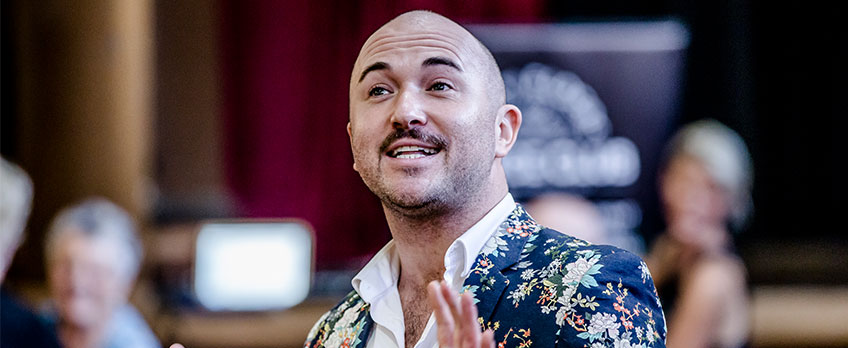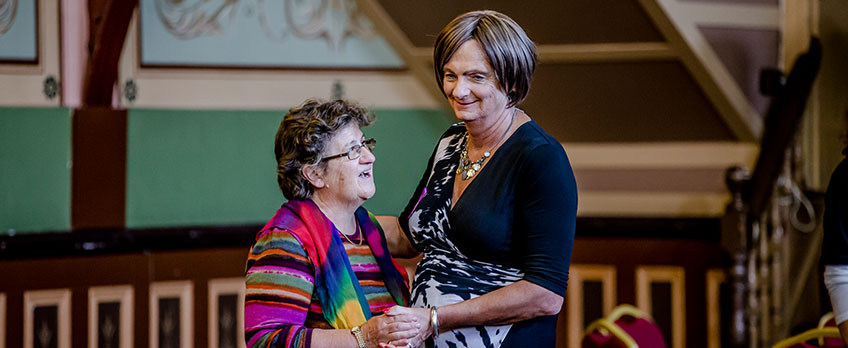Q&A with The Coming Back Out Ball Movie director Sue Thomson

The Coming Back Out Ball Movie (TCBOBM) chronicles an October 2017 dazzling rainbow carpet event and the LGTBIQ+ elders it celebrated – and this was in the midst of the same- sex marriage postal vote. What effect do you think this had on the film’s senior subjects and the making of the film more generally?
To be making a film about Australia’s LGBTI+ pioneers at the same time as the Marriage Equality campaign felt strangely coincidental. As important as it was though, I was led by our older cast and overall, they didn’t want to say too much about it. In fact, our cast were nonplussed about the campaign and why dredge up past traumas, pain and sadness.
In the film, the marriage equality campaign was a traumatic and poignant parallel with the historical discrimination faced by our elderly participants and the Ball Tristan was putting on at the Melbourne Town Hall - a Ball to celebrate and honour older LGBTI+. Most of them had never dreamed of getting married and they certainly didn’t want to get married now. They felt it was the elected government’s decision to make, not theirs. However, the magnitude of the Ball falling right before the vote, impacted on everyone in attendance and the feeling in the room was palpable.
Deborah Cheetham’s extraordinary speech on the night reminded us that marriage equality is a basic human right. This coincided so powerfully with the debate raging in every household around the country. It felt like something significant.
A key issue in the film is LGTBIQ+ seniors going into aged care or accessing home care services are at risk of going “back into the closet”? Was there a particular moment that struck your attention or has this issue always been on your radar? And how did this inform the film’s wider concerns of visibility (or otherwise) for older LGTBIQ+ persons?
Academic and researcher Dr Catherine Barrett wrote a paper on older LGBTI+ going back into the closet to avoid discrimination and get better health care. Tristan read this and felt moved to do something. Once he decided on producing the ball he asked me if I’d like to document the process. The idea that people are hiding their true identities to receive decent health care shocked and saddened me. I felt if we could inform, educate and affect change in even the smallest way by making this film, then we were doing something important. Listening to the stories of so many older people over the last three years, people who have faced fear, discrimination and marginalization for their entire lives, has been heartbreaking. They were keen to share their stories with me and have them taken to a wider audience.
In making a film with senior characters were there any particular thrills or challenges you faced?
My past work has included elderly participants and exploring the lives of isolated LGBTI+ people was an important story to tell. Becoming friends with the people in the film was an educational wonderland. They’re often less constrained by politeness and ‘doing the right thing’ and therefore they can be irreverent, opinionated, wise, forthright and funny. They have so much to give us, so much to teach us.
Health issues are serious anytime but when working with an older cast, it was something we factored into our schedule, so we could be flexible if an interview was postponed or cancelled due to illness.
I have come to realise that many older people are time-conscious, I’ve been noticing this more and more with my own father who is 83. If I told a cast member that an interview would be an hour – it had better be an hour because they have another appointment to get to. There is no time to waste when you’re elderly. If I said I’d be there at 11am for an interview, they would be waiting ready to start at 10am. We became the most punctual film crew in Melbourne!

Having had fought for equality from a time that could have had you imprisoned or excluded from society, LGTBIQ+ seniors have so many experiences and stories to share. What stories did you find important to capture in the film and why?
That’s a hard question to answer, but an important one. This film documents the diverse communities within the LGBTI+ community and the historical discrimination, marginalization and isolation faced by these people. Exploring LGBTI+ people’s lives is difficult and sometimes painful to travel. I chose to celebrate the joy so many of these people have found, despite the personal trauma suffered. Ultimately, I chose the stories that reminded us of this trauma but acknowledged that times are changing and life is for living, no matter what our sexual or gender identity is, or how old we are!
This is a very joyous film – a real love letter to the pioneers in the gay liberation movement as well as those who have come out late – is there a bigger goal that you’re wanting to achieve for LGTBIQ+ seniors with the making of the film?
The power and privilege of documentary filmmaking is that we listen to and re- tell stories. The film exists forever, it has captured a moment in time and can be passed down through generations, so that these stories are never forgotten.
Working with the elderly cast of this film was a joy. There are so many wonderful people that didn’t make it into the film, but The Coming Back Out Ball Movie has captured just a few of the stories told to me.
All the people in the film have said that being a part of the documentary, over so many months, assisted in them to formulate their own story/narrative. In a way, the very existence of the film is already affecting change. When you’re asked to tell your story, answer questions about your life over a long period of time it allows/encourages you to create/articulate the story of your identity, and for some of our cast, this was particularly significant. They expressed to me that because of the questions I put to them, they were forced to consider issues they had avoided or kept buried. Being in the documentary made them feel valued, heard and respected.
Personally, I could think of nothing more powerful than making another film about older people in our society.